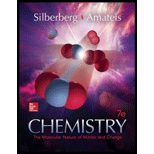
Concept explainers
(a)
Interpretation:
Empirical formula of mercury (I) chloride has to be given.
Concept introduction:
Empirical formula:
Empirical formula is the formula giving the proportions of the elements present in a compound but this does not give the actual numbers or arrangements of the atoms of the respective molecule.
(b)
Interpretation:
Concentration of
Concept introduction:
Saturated solution:
Saturated solution is defined as a solution in which no more solute can be dissolved in the solvent. A solution is found to be saturated when on addition of solute it is precipitated instead of solving at normal temperature.
Solubility:
Solubility is defined as the maximum amount of the solute that can be dissolved in the solvent at equilibrium.
Solubility product constant:
Solubility product constant is defined for equilibrium between solids and its respective ions in the solution. Generally, solubility product refers only to insoluble or slightly soluble ionic substances that make equilibrium in water.
It defined as the product of concentration of ions of a sparingly soluble salt in its saturated solution at
This value indicates the degree of dissociation of a compound in water. More the value of
Considering an equilibrium of salt
(c)
Interpretation:
The concentration of
Concept introduction:
Saturated solution:
Saturated solution is defined as a solution in which no more solute can be dissolved in the solvent. A solution is found to be saturated when on addition of solute it gets precipitated instead of solving at normal temperature.
Solubility:
Solubility is defined as the maximum amount of the solute that can be dissolved in the solvent at equilibrium.
Solubility product constant:
Solubility product constant is defined for equilibrium between solids and its respective ions in the solution. Generally, solubility product refers only to insoluble or slightly soluble ionic substances that make equilibrium in water.
It is defined as the product of concentration of ions of a sparingly soluble salt in its saturated solution at
This value indicates the degree of dissociation of a compound in water. More the value of
Considering an equilibrium of salt
(d)
Interpretation:
The amount of
Concept introduction:
Saturated solution:
Saturated solution is defined as a solution in which no more solute can be dissolved in the solvent. A solution is found to be saturated when on addition of solute it gets precipitated instead of solving at normal temperature.
Solubility:
Solubility is defined as the maximum amount of the solute that can be dissolved in the solvent at equilibrium.
Solubility product constant:
Solubility product constant is defined for equilibrium between solids and its respective ions in the solution. Generally, solubility product refers only to insoluble or slightly soluble ionic substances that make equilibrium in water.
It is defined as the product of concentration of ions of a sparingly soluble salt in its saturated solution at
This value indicates the degree of dissociation of a compound in water. More the value of
Considering an equilibrium of salt
(e)
Interpretation:
Amount of
Concept introduction:
Saturated solution:
Saturated solution is defined as a solution in which no more solute can be dissolved in the solvent. A solution is found to be saturated when on addition of solute it gets precipitated instead of solving at normal temperature.
Solubility:
Solubility is defined as the maximum amount of the solute that can be dissolved in the solvent at equilibrium.
Solubility product constant:
Solubility product constant is defined for equilibrium between solids and its respective ions in the solution. Generally, solubility product refers only to insoluble or slightly soluble ionic substances that make equilibrium in water.
It is defined as the product of concentration of ions of a sparingly soluble salt in its saturated solution at
This value indicates the degree of dissociation of a compound in water. More the value
Considering an equilibrium of salt
Want to see the full answer?
Check out a sample textbook solution
Chapter 19 Solutions
Chemistry: The Molecular Nature of Matter and Change - Standalone book
 ChemistryChemistryISBN:9781305957404Author:Steven S. Zumdahl, Susan A. Zumdahl, Donald J. DeCostePublisher:Cengage Learning
ChemistryChemistryISBN:9781305957404Author:Steven S. Zumdahl, Susan A. Zumdahl, Donald J. DeCostePublisher:Cengage Learning ChemistryChemistryISBN:9781259911156Author:Raymond Chang Dr., Jason Overby ProfessorPublisher:McGraw-Hill Education
ChemistryChemistryISBN:9781259911156Author:Raymond Chang Dr., Jason Overby ProfessorPublisher:McGraw-Hill Education Principles of Instrumental AnalysisChemistryISBN:9781305577213Author:Douglas A. Skoog, F. James Holler, Stanley R. CrouchPublisher:Cengage Learning
Principles of Instrumental AnalysisChemistryISBN:9781305577213Author:Douglas A. Skoog, F. James Holler, Stanley R. CrouchPublisher:Cengage Learning Organic ChemistryChemistryISBN:9780078021558Author:Janice Gorzynski Smith Dr.Publisher:McGraw-Hill Education
Organic ChemistryChemistryISBN:9780078021558Author:Janice Gorzynski Smith Dr.Publisher:McGraw-Hill Education Chemistry: Principles and ReactionsChemistryISBN:9781305079373Author:William L. Masterton, Cecile N. HurleyPublisher:Cengage Learning
Chemistry: Principles and ReactionsChemistryISBN:9781305079373Author:William L. Masterton, Cecile N. HurleyPublisher:Cengage Learning Elementary Principles of Chemical Processes, Bind...ChemistryISBN:9781118431221Author:Richard M. Felder, Ronald W. Rousseau, Lisa G. BullardPublisher:WILEY
Elementary Principles of Chemical Processes, Bind...ChemistryISBN:9781118431221Author:Richard M. Felder, Ronald W. Rousseau, Lisa G. BullardPublisher:WILEY





